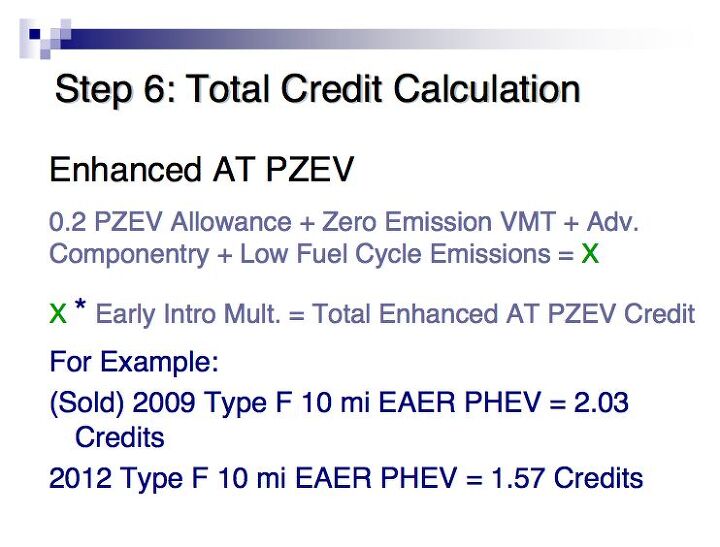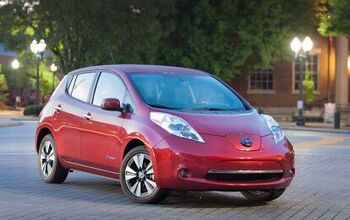Nissan to Start Selling California ZEV Credits, Joining Tesla
Tesla recently released financial figures that the company says demonstrate profitability. According to Automotive News, analysts have pointed out that some of Tesla’s revenue comes not from selling cars but rather by selling zero-emission credits to other car companies that want to do business under California’s clean-air regulations. If they want to sell cars in California, companies have to comply by either producing ZEVs or by obtaining credits from companies that make those vehicles. Now Nissan Motor Co, whose Leaf is the best selling electric car of all time, has joined Tesla in selling those credits. Tesla was able to sell those credits because they only make electric vehicles. Makers of conventional cars and trucks buy the credits to theoretically offset the pollution caused by those cars. Since Tesla has no such conventionally polluting cars to offset, they can sell their credits. Nissan executive VP Andy Palmer told reporters earlier this week that at this point Nissan has sold enough Leafs to cover its own needs to comply with the California Air Resources Board‘s rules and will now start selling surplus credits to other automakers. “We’ve got carbon credits to sell, and we’re selling them — California ZEV credits.” No details were forthcoming on time, price or to whom Nissan will sell their credits.
In the first half of 2013, Tesla brought in $119 million, or 12 percent of its revenue, from ZEV credit sales. Each Tesla Model S accrues as many as seven ZEV credits for the EV startup. Each Leaf sold in California and the other states that participate in CARB’s program, earns 3 credits. CARB has no say in how much a company can charge for the credits and their customers do not have to be disclosed.
“While Nissan has been approached by other automakers regarding emission-credit transactions, these discussions and the outcome of any transactions is held in strict confidence by all involved parties,” David Reuter, a spokesman Nissan, said.
Since the end of 2010 when it went on sale, Nissan has sold about 75,000 leafs around the world, with California being one of its biggest markets, and it expects to sell at least 20,000 in the U.S. this year, about double what it sold in 2012.
More by TTAC Staff
Latest Car Reviews
Read moreLatest Product Reviews
Read moreRecent Comments
- Probert They already have hybrids, but these won't ever be them as they are built on the modular E-GMP skateboard.
- Justin You guys still looking for that sportbak? I just saw one on the Facebook marketplace in Arizona
- 28-Cars-Later I cannot remember what happens now, but there are whiteblocks in this period which develop a "tick" like sound which indicates they are toast (maybe head gasket?). Ten or so years ago I looked at an '03 or '04 S60 (I forget why) and I brought my Volvo indy along to tell me if it was worth my time - it ticked and that's when I learned this. This XC90 is probably worth about $300 as it sits, not kidding, and it will cost you conservatively $2500 for an engine swap (all the ones I see on car-part.com have north of 130K miles starting at $1,100 and that's not including freight to a shop, shop labor, other internals to do such as timing belt while engine out etc).
- 28-Cars-Later Ford reported it lost $132,000 for each of its 10,000 electric vehicles sold in the first quarter of 2024, according to CNN. The sales were down 20 percent from the first quarter of 2023 and would “drag down earnings for the company overall.”The losses include “hundreds of millions being spent on research and development of the next generation of EVs for Ford. Those investments are years away from paying off.” [if they ever are recouped] Ford is the only major carmaker breaking out EV numbers by themselves. But other marques likely suffer similar losses. https://www.zerohedge.com/political/fords-120000-loss-vehicle-shows-california-ev-goals-are-impossible Given these facts, how did Tesla ever produce anything in volume let alone profit?
- AZFelix Let's forego all of this dilly-dallying with autonomous cars and cut right to the chase and the only real solution.


































Comments
Join the conversation
California taxpayers don't pay a single red cent -- companies buying the credits pay.
Ironically those Teslas don't offset any oil consumption since those are toys for rich people who still keep their Porsche and BMW for daily driving. Maybe I buy stock in coal mining since the electric utilities will like that EV business a lot. those credits are like the Nigerian prince who sends me emails asking for help tranferring his inheeritance. Even private people can buy carbon credits (if you feel bad about your last plane trip) and pay someone to "offset". Obvioulsy there is no verification what that offsetting actually is, or if it even happens. But it makes stupid people feel good about themselves... so it seems worth the money.